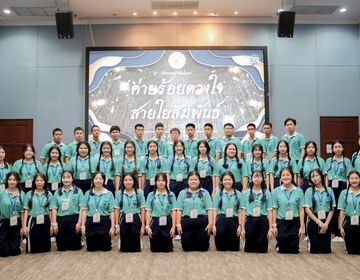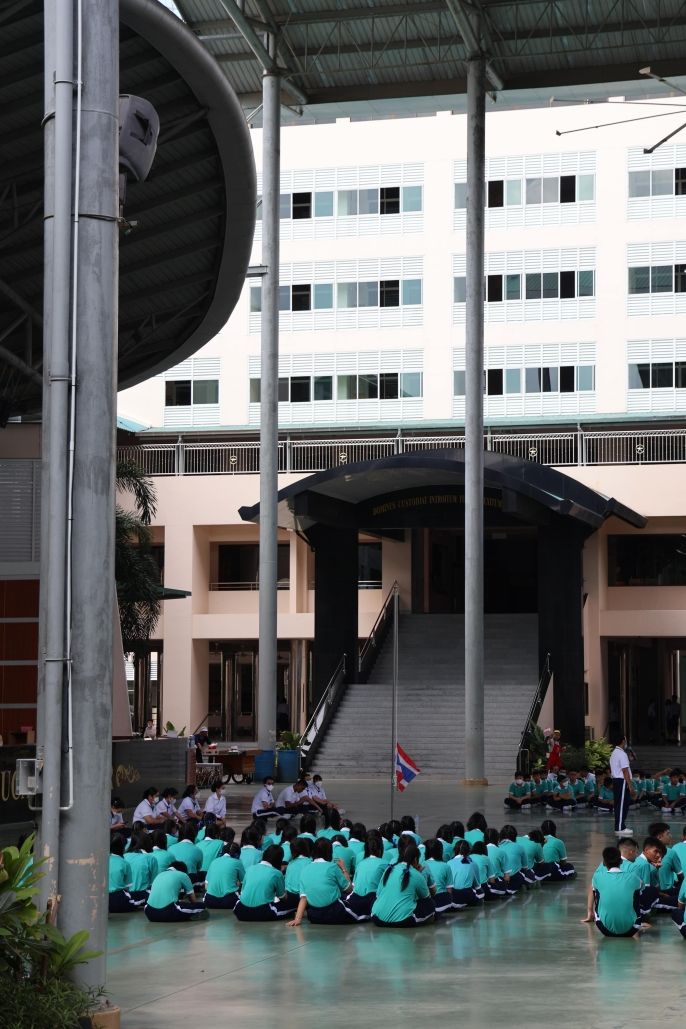Understanding Thai School Culture: Two Weeks in Pattaya
Those who have traveled to other countries have encountered culture shock before. It may be realizing that you pay for water at a restaurant or public restroom. Culture shock may be learning that restaurants do not stay open as late as you expect or that they open too late for your preference. Even with short vacation stays in a country, it happens to all of us at some point. The longer you stay in a country, the more you continue to unravel the complexity of the country’s culture.
It has been two weeks since I arrived in Pattaya, and there have been culture shocks adjusting to Thai culture and everyday life. Yet, my role as a teacher in Thailand adds another layer of cultural shock beyond visiting a country for a few weeks or months or studying abroad during university. In many ways, the Thai school system reflects a system reminiscent of my time in primary and middle school in the US. However, as I have dug beneath the surface by talking with my students, colleagues, and supervisors, and through observing classes, I see the many ways that the school systems of each country reflect so much of each country's cultural beliefs, norms, and values.
Indirect Communication
As I was preparing to go abroad, I was reminded time and time again that Thailand is a culture whose communication style is indirect while Americans are direct. As an American, I am accustomed to clear communication where conversations are short and efficient, and words are taken at face value. However, in an indirect communication culture like Thailand, what is said in a conversation or message is not always what the speaker means. Instead, communication focuses on non-verbal communication and underlying messages. Demands or orders are replaced with subtle suggestions and should be taken as more than advice, especially when coming from a co-worker or supervisor.
To give an example of the indirect communication I’ve experienced, I remember that on orientation day, I asked my supervisor about a communal kitchen in the apartment building. Initially, when signing my contract and receiving my housing, there was no indication that we would have access to a kitchen, so I was curious about this communal kitchen I saw. In response to my question, “Are we allowed to use the kitchen,” my supervisor said, “You don’t have to worry about cooking.” This response puzzled me since she did not directly answer my question. After about three days of inquiring about it to other teachers and supervisors, I gradually discovered that the kitchen was not for communal use but instead for the use of the supervisors and those higher up in the school hierarchy.
Collectivism
Individualism and collectivism are among the most famous of cultural dimensions. Collectivistic cultures consider what is best for people on a collective level/ as a greater whole. Meanwhile, individualistic cultures place a higher value on what is best for people on an individual level and value autonomy and personal identity more than unity, harmony, and cooperation. After just the first two weeks at my school, collectivism is among the main cultural shocks I have experienced.
After teaching my first few classes, I noticed that singling out students did not lead to the most successful classes. When reading texts in class, I initially asked my students to volunteer to read a paragraph. After the first few classes and through observation of other teachers in the class, I began to see that students seemed to thrive with choral reading rather than by reading solo. When the class got to read together in unison, more students became engaged and grasped the material better.
Considering the effect of collectivistic culture in Thailand also helped me better understand the ideas behind the grading system and the ethics of cheating in my school. Starting with the latter, one thing I found to be jaw-dropping is that my students cheat with quite some frequency. They copy directly off each other in class and even sometimes right in front of my eyes. I once even saw my students borrow their Thai teacher’s phone and use Google Translate in class!
Though cheating is frowned upon, it is still part of the culture here. Though this initially felt uncomfortable and shocking (and I still can't say I condone it), after considering it from a cultural standpoint, I saw how cheating supports the idea of considering the harmony of the larger class. When I was in middle school in the US, teachers discouraged us from cheating by reminding us of how unfair it would be to have someone else copy our work and get the same grade even though we did the hard work. However, in Thailand, that same logic would be less applicable since the country places a higher value on collaboration and harmony of groups.
This same logic applies to the skewed grading systems I've become familiar with. At my school, the LOWEST grade a student can get is 70%. Even if students do not complete an assignment, they still receive a 70%. How we grade is a complicated process, but the most important thing is that based on a student's raw score, we add an adjustment for every assignment that boosts their score. The better they initially did, the less of a boost they needed. For example, my student who got 30% will end up with 70%, and my student who initially had 70% will end up with 85%. Once again, I found this system to be unrepresentative of the work for each student and unfair to students who initially had higher scores. Yet considering the emphasis on collectivism in the culture, this method allows students to save face when they are less proficient in their school subjects.
Lastly, I have also seen collectivism embedded in the school system by how much teachers and students work and stay at school outside of school hours. In my experience in the US school system, most students stayed at school only when school was in session. Yet here in Thai schools, I see so many students stay after school in their classroom, just spending time with their teacher. Other students who stay late help clean the school by wiping down boards, desks, and windows. Teachers here are also expected to help around the school by being crossing guards, setting up lunch tables, and organizing students before and after school. Both teachers and students contribute to their school and take ownership of their role in their communities.
Value of Education
Though I knew before coming to Thailand that Thais value education, there is a big difference between knowing and experiencing this difference. One major culture shock was learning about how much students go to school. As part of my weekly teaching load, I teach three extra classes a week after school hours for my students. Though my classes are small with only six students, I know that many of my students have tutors outside of school that they work with. Having a tutor or additional schooling outside of school is much more typical here than in the States.
Beyond their extra time with tutors, many students attend Saturday and/or summer school. After speaking with the vice principal of my school about student attendance in extra school, he estimated that about 30% of all students attend Saturday school, and close to 70% of students come for the short summer semester of school. The reasoning behind the extra hours, as put by my vice principal, is that parents do not want their kids to spend their free time sitting at home on their phones.
Importance of considering cultural dimensions
Among my list of reasons I chose to teach in Thailand, one major one was to experience living in a non-Westernized country. Part of living in a non-westernized country is learning and understanding the major differences in cultural norms and beliefs. Now that I am in Thailand experiencing this cultural difference from the standpoint of an employee in Thailand, I realize that the many individual cultural shocks I've encountered can be related to a few of these major categories of cultural dimensions. By considering these shocks from this standpoint, I've been better able to adapt to these differences and have a smoother transition to teaching in Thailand.
Related Posts

Thailand Through the Eyes of My 12th Grade Thai Students
What makes Thailand truly unique beyond its temples and street food? In this reflection, my 12th grade students in Thailand share what their country looks like from the inside — not as a tourist destination, but as home. Through their honest words, we see how Thai culture balances tradition and modern life, how respect, family values, and kindness shape daily experiences. Their perspectives offer an authentic glimpse into Thai society through the eyes of the next generation.

How Schools Shape Students in Thailand: A word from my students
What does school truly teach beyond textbooks and exams? In this reflection, three Thai students offer an inside look at how education shapes not only their academic futures, but their character and identity. Through their voices, we see that Thai schools function as more than places of learning — they are spaces where discipline, ambition, cultural pride, and respect are carefully cultivated. From the belief that education determines one’s future, to the daily practice of courtesy and social harmony, these students reveal how Thai education prepares young people not just for university, but for life. Their perspectives offer a powerful reminder that schools reflect the values of the society they serve.
My Halfway Mark: 5 Things I've Learned Teaching In Thailand
At the halfway point of my journey teaching in Thailand, I’ve realized this experience is about far more than lesson plans and classrooms. It is about adaptability, humility, courage, and connection. In this reflection, I share the five most important lessons I’ve learned so far, from learning to “be like water” in moments of uncertainty to saying yes to opportunities that push you beyond your comfort zone. This is not just advice for teachers in Thailand. It is a reminder that when you give your whole heart to a community, embrace growth, and choose courage daily, the experience will transform you in ways you never expected.

